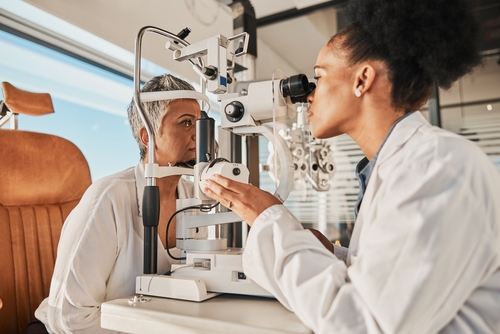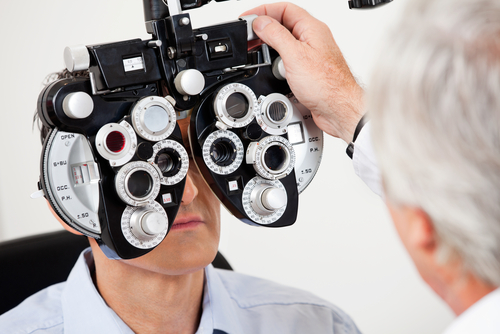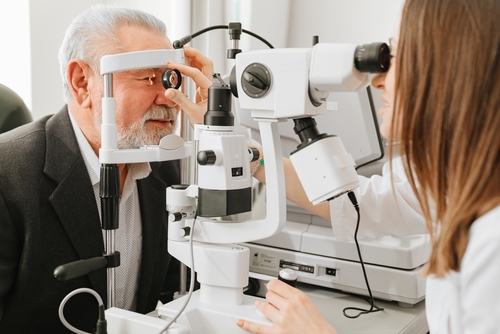What Should I Expect at My Next Eye Exam?
7/31/23
How long has it been since your last eye exam? If you can't remember the answer, that may be a sign that it's been too long.
Routine eye exams are vital to maintaining healthy eyes and vision. If you have a refractive error, your eyes should be examined annually to ensure your prescription is current.
But even if you think you have healthy eyes and 20/20 vision, you still need eye exams. What's more, the frequency that you have eye exams should increase as you get older.
Comprehensive eye exams involve several tests to ensure your eyes are healthy and working as they should. Keep reading to discover what you can expect at your next eye exam and why they are so important!
The Importance of Eye Exams

Do you see your primary care physician for a routine physical annually? Are you in the habit of going to the dentist for a cleaning once or twice a year?
Do you do the same when it comes to your eyes? Just as you put these preventative measures first, you need to do the same when going to the eye doctor and having your eyes checked.
The primary reason why eye exams are so important is that they're the only way to spot many eye conditions in their early stages. Eye conditions, especially age-related eye conditions, are common and can cause significant vision loss.
The best way to prevent total vision loss is to receive an early diagnosis and prompt treatment. Some eye conditions have no early symptoms like glaucoma and retinal diseases.
The damage done to the eye from these conditions is irreversible. For this reason, eye exams are the only way to prevent vision loss if you have these eye conditions because they allow your eye doctor to diagnose and treat them before permanent damage can occur.
The people with an increased risk for eye conditions are those over 40. But there are other risk factors, however.
As part of your eye exam, your eye doctor will assess your risk and recommend the best schedule for eye exams.
What Does My Eye Doctor Look For During an Eye Exam?
When you get an eye exam, your eye doctor primarily looks for signs of eye conditions and diseases. They'll look for signs of serious eye diseases like glaucoma and minor conditions like presbyopia and cataracts.
They will have you undergo several tests to measure your eyes and see how healthy they are. If you have a refractive error, they'll also ensure your prescription is up to date by testing your vision.
What Does My Eye Doctor Examine?
Your eye doctor will examine several things during your eye exam, but these tests can depend on your age and how healthy your eyes are. They will likely examine the following items:
Your Medical History
Before even looking at your eyes, your eye doctor will want to know your medical history and your family's medical history. Learning this information will help them assess your risk for various eye conditions.
By knowing your medical history, they'll also be able to keep any medical conditions you have in mind when examining your eyes.
Your Vision
 Whether or not you have a refractive error, your eye doctor will test your visual acuity. Your visual acuity will determine how well you can see.
Whether or not you have a refractive error, your eye doctor will test your visual acuity. Your visual acuity will determine how well you can see.
If you have a refractive error, they'll do a refraction, a more involved test of your vision, using a large device called a refractor. The refractor contains many lenses that your ophthalmologist will test in various combinations to determine your current and most up-to-date prescription.
Your Eye Pressure
High eye pressure can cause glaucoma, so checking your eye pressure is how your eye doctor screens for your glaucoma risk. Some ophthalmologists use a puff of air to measure your eye pressure, but at Washington Eye Specialists, we use a method called applanation.
There's no puff of air (which some patients find uncomfortable), and instead, a dye is applied to the eye and activated with a blue light.
Your Ocular Motility
Ocular motility testing assesses how well your eyes work together. This test can help diagnose eye misalignment issues such as strabismus and orbital trauma.
It can also help identify non-ocular conditions like thyroid disease.
The Inside Of Your Eye

Perhaps the most informative test your eye doctor will run is simply examining the inside of your eye. To examine the inside of your eye, your eye doctor will first dilate your pupils to make them easier to see through.
After dilating your pupils, your eye doctor will examine them with a slit lamp which magnifies the inside of your eye so they can see it in detail. This test allows your eye doctor to look for early signs of retinal disease on your retina.
It also allows them to examine everything inside your eye, including the optic nerve, lens, and tear film.
What Happens If My Eye Doctor Sees Signs of an Eye Condition?
 If your eyes are healthy and you're at low risk for eye conditions, your eye doctor likely won't see anything of concern during your eye exam. But if they see something worrying, the issue is probably still in the early stages and highly treatable.
If your eyes are healthy and you're at low risk for eye conditions, your eye doctor likely won't see anything of concern during your eye exam. But if they see something worrying, the issue is probably still in the early stages and highly treatable.
The more regularly you have eye exams, the more likely any issue will be detected early. Your eye doctor can answer any questions or concerns and develop the most appropriate treatment plan based on what is found during your eye exam.
Are you ready for healthier eyes? Request an appointment at Washington Eye Specialists in Washington, DC, today! Isn't it time to love your eyes again?



